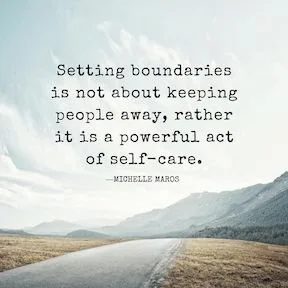Health and Boundaries: Clearing the Path to Success
Boundaries: I know we have all heard the word, and when you are in therapy or talking about having healthy mental health, the “Boundaries” word comes up A LOT, but what does it mean, and why are they so important? Let’s talk about it, starting with what exactly what boundaries are. The definition of boundaries is a line that marks the limits of an area; a dividing line. We can use that definition when it comes to emotional well-being too. So this “line” can be physical space or limits around one another; it can be emotional space or limits, like not taking responsibility for another person’s feelings or actions and only taking responsibility for your own. A boundary can also be a protection from another person or physical space, for example, saying no to a neighbor borrowing the car or a fence to protect us from falling off a cliff.
Why do we need boundaries?
Boundaries help us maintain our own energy, and they help us build and maintain relationships with others. They help us not to build resentment or anger, and they help us not reach burnout; plus, they allow us to communicate freely and openly, as they create emotional and physical safety. You can think of boundaries as a way to provide a deeper connection to ourselves and those we love and care about. For example, if you and your wife need time away from the children because you haven’t had alone time in six months, setting up a four-hour “time out, aka dinner with the wife,” is compassionate and kind to you; your wife, and the children. Additionally, boundaries protect us from people that want to take advantage of us or those who devalue us or do not respect us, such as abusers.
What stops us from creating and maintaining boundaries?
People feel guilty setting boundaries because they feel they are being “mean” to the other person. In reality, if you are using assertive communication and not aggressive communication, your boundary is clear and set, and it’s not mean at all. None of us want to upset people; sometimes, setting a clear boundary makes others upset. However, setting a healthy boundary helps us to prioritize ourselves. A boundary like putting your dirty dishes in the dishwasher when you are done eating is a simple request. Verses being upset because your son leaves out his snack plate daily. We have often been taught not to say something or be upset when others cross our lines. However, if the behavior continues, it sets us up for a fight, and nobody wins.
How can we set and maintain healthy boundaries?
Being very clear and assertive in your communication is a start to healthy boundaries. Do things that YOU want to do in your life and not only what others are wanting or expecting of you; if it does not fit your narrative for your life, you are not obligated to go on with it. Accepting when another person says no is a sign that you are respecting their boundaries. Always be respectful when setting boundaries with others, and a great way to do this is using “I statements.”
Examples of boundaries:
Here are some examples of healthy boundaries to get you started:
Physical- shaking hand or fist bump instead of hugging, not entering someone’s personal space like a bedroom or office without asking,
Emotional - If you are in a challenging emotional space, you can ask the other person if they are in a space to hear your issues at that moment. On the flip side, if someone is putting all their emotional baggage on you and you are in a tough emotional spot, letting them know that you are not in a place to handle their emotions. Setting clear boundaries with time, such as “I can only come over for one hour.”
Financial- this is a big one; talk about expectations, who pays for what, how do they pay cash credit, and how you determine who and how they pay. Money is a value that comes from our childhood family, so when couples get together, you must talk about who pays the bills, when they should be paid, how we decide what to buy and how much we can spend without having to talk to the other person.
Sexual- asking for consent, being clear about what pleases you and your partner, requesting protection, discussing contraception, and saying no to things you do not like or want.
Also, remember, no one is perfect, and sometimes we all have crossed a boundary line. If you notice, you have to stop and readjust. Maybe you said yes to hosting the baby shower, but you are just too overwhelmed and need to say no or get others to help. Make the adjustments and allow others to do the same. People are not minding readers, so we must gently tell them where our dividing line is. Do not expect them to “just know” or even to remember from the last time. Tell them again, be clear and Also, remember, no one is perfect, and sometimes we all have crossed a boundary line. If you notice, you have to stop and readjust. Maybe you said yes to hosting the baby shower, but you are just too overwhelmed and need to say no or get others to help. Make the adjustments and allow others to do the same. People are not minding readers, so we must gently tell them where our dividing line is. Do not expect them to “just know” or even to remember from the last time. Tell them again, be clear and be polite.
By Courtney Whetstone, LMFT
Courtney works in our Murrieta office, and she approaches clients by working collaboratively with each client to create a path to a happier and more fulfilled life. She helps clients by increasing self-awareness, reducing emotional triggers and barriers. She is great at developing goals and limit setting with clients. Courtney loves working with people that suffer from anxiety, compulsive behaviors, couples, and teens. If you need help with boundaries, call us today to work with Courtney.


